
Potli
By Dr Khalid Aftab
Sang-e-Meel Publications
ISBN: 969-3536177
239pp.
he world renowned British linguist Roger Fowler’s view of realism espoused relatable characters positioned within the domain of everyday situations that lead to plausible events but which negated the need for a writer to provide a “detailed reportage of physical minutiae of everyday life”; opting for a social commentary instead. Barring the social commentary requirement is precisely what Dr Khalid Aftab sets out to do in his handsomely produced collection of 19 Urdu short stories titled Potli.
As the first vice chancellor of the Government College University, Lahore, and a distinguished and highly respected economist and researcher, Dr Aftab enjoys an enviable reputation within academic circles. In the history of the institution itself, there have been only two principals/ vice chancellors who have consciously chosen literature as a medium to address contemporary socio-political issues, with reference to the collective attitudes of society.
Professor Ahmed Shah Bokhari, better known as Patras Bokhari, and his humorous essays bordering on absurdist literature made his mark as principal, commencing with his tenure in 1946. While Bokhari’s forte was essays and particularly humorous ones, it is equally interesting to note that, shortly after retirement from service, Dr Aftab appears to have discovered a second career as a writer of Urdu fiction.
Dr Aftab’s recently discovered talent may partly be attributed to a special DNA link to the famed Urdu writer Ashfaq Ahmed, who was his paternal uncle. But the stories are distinctly Aftab’s. The man writing Potli is neither vice chancellor nor economist but an objective ‘outsider’ skillfully capturing nuances of largely non-benevolent, competitive, self-centred characters and events that border on the absurd.
Whether a story concerns itself with an unknown man sunning himself on a cold winter morning in his courtyard being regaled with anecdotes about local film stars by a potbellied, greasy-haired man looking for a job, or acting like the proverbial fly on the wall, recording scenes of a marriage turned bitterly cold in the face of the wife’s ‘potli’ [bundle] of complaints — from which the collection itself gets its title — or, in yet another instance, narrating the bare-boned story of a woman returning home to her two children after a prolonged mysterious absence, with a young child in tow and an explanation that verges on a Punjabi film plot, Aftab’s presence as writer is never intrusive.
A first collection of short stories by a renowned academic fuses the absurd with realism and explores social layers of contemporary society with minimalist prose and an almost cinematic approach
In crisp, plain Urdu, which occasionally uses Punjabi expletives with delightful abandon, his approach to the many characters he introduces his reader to is almost cinematic in approach, as a few lines suffice to sketch masterful portraits. Like an artist using the immensely challenging medium of charcoal, which is notoriously prone to smudging, Aftab is visibly egalitarian in his writing as he courageously explores the social layers of contemporary society, weaving stories between the twin domains of the haves and the have-nots.
Collectively, his world is one in which, regardless of social status, all his characters appear to carry a distinctly personal ‘potli’, which is increasingly cumbersome and needs airing. If it is not the acerbic complaints of a seemingly unloved wife, it is the ramblings of a man facing interrogation in the local police thana. Each potli, when unknotted, testifies to the utter helplessness and misery of men and women living empty lives in a world oblivious to individual pain.
In this respect, Potli may well be seen as an anthology attempting to maintain a precarious balancing act between realism and absurdism. The reader cannot help but be drawn to the striking parallel between the story of Albert Camus’ Sisyphus, condemned to push a large stone uphill only to have it roll down again in an endless cycle of struggle and survival in a pitiless world, and Aftab’s stories, with one significant difference. The gods who punished Sisyphus in Promethean fashion have been replaced by Aftab with pygmy-like figures of authority like the local havaldar [policeman] who, in the given context, wields an authority as potent as that of the gods of yesterday.
In Western literary history, the short story made its first appearance in the 19th century. In a world recovering from the ravages of global wars, the older traditional genre dictated by Giovanni Boccaccio’s tales found itself understandably replaced by a new form. By the 1950s, literature had been impacted by drama, the prose of Kafka and the artistic movements of Dadaism and Surrealism, giving rise to what the Danish philosopher Søren Kierkegaard called the idea of the absurd.
Fully developed into a philosophy by Albert Camus in The Myth of Sisyphus, the tensions created by humanity’s need for meaning in a post-World War scenario and the universe’s inability to provide any solace, birthed the movement called Absurdism. Absurd in form, plot or both, Samuel Beckett with his Waiting for Godot and Eugene Ionesco with his Chairs became the key figures associated with the latest genre.
At home, we need not look to Western literary traditions to elaborate upon the genesis of Absurdism; one can see that, in the Subcontinent, the new oeuvre is clearly visible in the poetry of the renowned poet Mirza Asadullah Khan Ghalib. Witnessing the devastation in the aftermath of the failed 1857 War of Independence, Ghalib’s desperation generated a deep depression from which he never recovered, resulting in a permanently destabilised life, while the tone of his poetry appears to have preempted the rise of Absurdism in the West.
Reading through this collection of stories, one can see that Aftab’s narrative world swings between the binaries of realism and Absurdism, like a pendulum switching between opposing points, representing need on the one hand and a profligate affluence on the other, in equal measure.
The language remains deceptively simple, employing an almost dry, descriptive tone, creating a challenge for the unwary reader. Instances such as the man sunning himself on a cold winter morning in his courtyard suffering being regaled with anecdotes about local film stars by a potbellied, greasy-haired man looking for a job, only to offer him one at the end in an unexpected move, abound. They hammer home the idea of how absurd and meaningless life can be!
The ‘potli’ itself, in local culture, is a common ubiquitous drawstring bag used for a variety of things. In cultural imagination, the word brings up images of the tiny, embroidered bags used by aristocratic Lucknow men and women to carry their favourite mix of mouth fresheners, consisting of cardamom, roasted fennel seeds and silvered betel nut or gold pieces. However, the potli referred to in Aftab’s story is more akin to the rough and ready knotted piece of cloth used to bundle clothing or personal items of use in the absence of a suitable case or trunk.
Aftab’s Potli of stories, therefore, is a collection stripped of any romantic or glamorous connotations, as his characters concern themselves with the stained, knotty metaphoric compendium of their lost dreams, asphyxiated desires, and angst weighed down by a perpetual dread of the unknown.
One of the many striking features of the stories is the deliberate and skillful deviation from the accepted structure of storytelling, which implies a beginning, a middle and an end. By contrast, many of Aftab’s stories remain open-ended, in that he offers no explanation for the reader’s inevitable query of ‘what next?’ as events take place and lives remain in limbo permanently daubed with disappointment.
For example, consider the story of Basharat who comes to Lahore to seek his fortune and is robbed of his potli at the darbar of the city’s most respected Sufi saint, forcing him to leave in as wretched a state as when he had come. The story may easily be interpreted as an Absurdism parable, signifying the emptiness of man’s life on earth as he struggles to survive, only to succumb to the inevitability of fate and return with hands as empty as those at the time of birth.
Aftab deals with his characters with an uncommon generosity, as he allows them to speak for themselves. As a result, the exchanges between his characters lend themselves well to radio, much in the same vein as that master-storyteller Manto’s characters do in his admirable collection of radio plays.
Needless to say, the craft of the short story-writer demands almost the same strict discipline as that practised by a ghazal-writer. Brevity and compactness, combined with the ability to create graphic visual images using a minimum number of words, is a skill that is honed over years of practice. Dr Aftab, however, appears intuitively gifted, as his ear readily catches the colloquial idiom in Urdu and Punjabi, while the eye captures the finest detail, such as that of the gargantuan appetite of Lahore’s denizens in their quest for good food, pretty women (who may or may not be available) and the rekindled passion of advancing age.
In capturing the visible deterioration of ethical and socio-cultural values in contemporary society, Dr Khalid Aftab’s collection is a welcome addition to the popular oeuvre of the Urdu short story, especially since it fuses an active sense of the Absurd and realism with quiet finesse in language that is reader-friendly, to which the elegant printing on quality paper adds substantially. This is a collection not to be missed.
The reviewer is Academic Adviser/Head, Resource Centre, Lahore Grammar School
Published in Dawn, Books & Authors, January 12th, 2025

















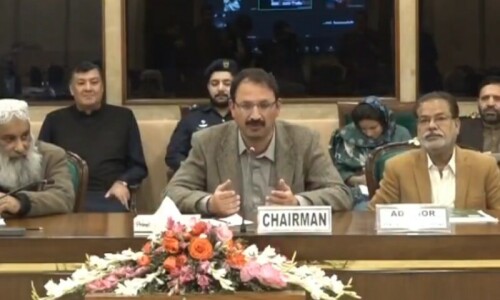


















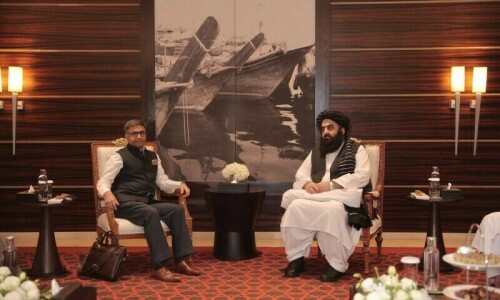
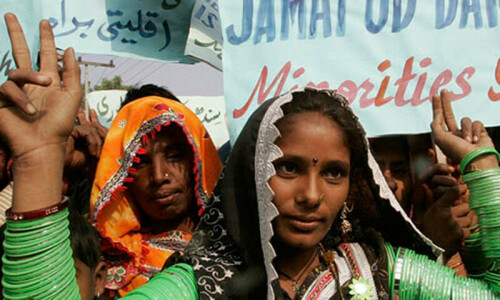



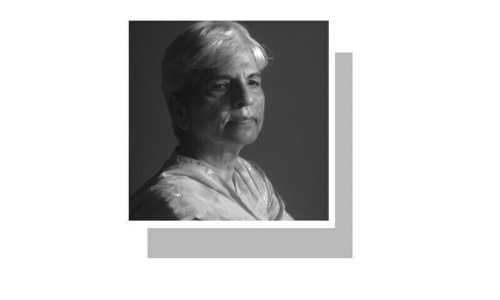



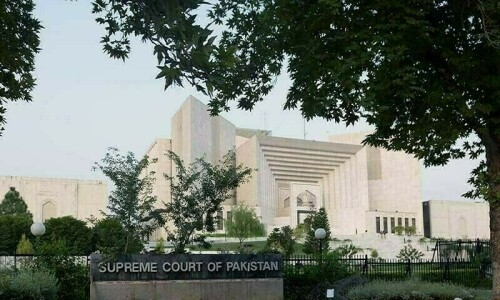



Dear visitor, the comments section is undergoing an overhaul and will return soon.